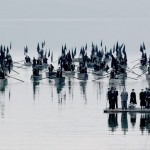Dir. by Theo Angelopoulos
Angelopoulos introduced his latest with very few words. It is to be the first of three films about the life of a Greek woman who manages to survive the 20th century, and its concern is “the human condition.” What more would you expect?
The Weeping Meadow opens with its first of many meticulously composed, extreme long shots. It is 1919, and a group of refugees have made land near Thessaloniki. At the center of the frame are Spyros (Vasilis Kolovos), his wife and son (Nikos Poursanidis), and Eleni (Alexandra Aidini), the young orphan he has adopted. The Trilogy will be Eleni’s story, and in The Weeping Meadow we are given the first 40 years of it — her love of Spyros’s son, her giving birth to twins, and the tragedy of her many losses during World War II and the Greek civil war that followed.
The Weeping Meadow takes its shape from Classical Tragedy, but the Fates, in this case, are not so deterministic as to run trod over the complexities of life. While bathed in a sheen of melancholia and mourning, the film still takes great delight in the intensity of young love, the vitality of community, and the simple pleasures of music. Eleni’s young husband is a gifted accordionist whose original composition is developed first on-screen and is then folded into the film’s score, returning occasionally in the final act to comfort Eleni like a Greek chorus.
This was my first Angelopoulos film, and so, perhaps, others who are more familiar with his work and who are accustomed to seeing it projected in 35mm will be less overwhelmed by the film than I was. I sat there in a stupor, to be honest, constantly in awe of the immensity of his imagination. The still image posted above is just one of thirty or forty that could be stripped from its context and hung on a gallery wall. And equally impressive were the choreographed camera movements that lasted for minutes at a time, exploring landscapes and interiors with the detailed eye of a great novelist. I actually gasped at the end of one shot, which like Russian Ark in miniature, captures an entire drama in a single take. Angelopoulos’s camera follows his young lovers through a noisy dance hall where they are confronted by a threat from their past. Setup, conflict, resolution — all in a single movement. Unbelievable.
One week and nearly twenty films later, my imagination is still alive with memories of The Weeping Meadow. There are images in this film — sheep hanging from a tree, water rising around an ancient village, a floating funeral procession, a field of billowing white sheets — that I would not have imagined possible. Like the first time I saw Tarkovsky and Cassavetes, seeing Angelopoulos has forced me to reconsider the potential of cinema. Highly recommended.
